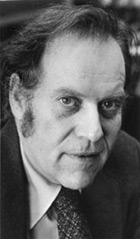|
|
|
AROUND THE QUADS
IN MEMORIAM
Sidney Morgenbesser, John Dewey Professor Emeritus
of Philosophy, died on August 1 in Manhattan from complications
of amyotrophic lateral sclerosis. He was 82. Morgenbesser was equally
celebrated for his kibitzing and witticisms as for his teaching
skills and subject knowledge.
Morgenbesser was born on September 22, 1921, in New York City. After
graduating from The Jewish Theological Seminary — he was ordained
a rabbi — and City College, both in 1941, he earned an M.A.
and a Ph.D. from Penn in 1950 and 1956, respectively. After teaching
at Swarthmore and the New School for Social Research, Morgenbesser
joined Columbia’s faculty as a lecturer in 1953. By 1966,
he was a full professor; in 1968, he was a member of a faculty panel
that drafted proposals to reform the University after the student
unrest (during which he suffered “a good hit on the head”);
and in 1975, he was named John Dewey Professor of Philosophy. He
had visiting professorships at Princeton, Rockefeller, Brandeis
and Hebrew universities.
A Guggenheim fellow, Morgenbesser served as chairman of the New
York chapter of the Society for Philosophy and Public Affairs and
was an associate fellow at the Institute of Policy Studies. He was
a book review editor of The Journal of Philosophy and a
member of the editorial board of The Nation. His interests
included pragmatism, human rights, philosophy of the social sciences
and theory of knowledge.
Popular with students and colleagues, Morgenbesser was best known
for his keen intellect, collaborative teaching style and acute wit.
When he was honored with the Society of Columbia Graduates’
Great Teacher Award in 1982, Morgenbesser was lauded for his “outstanding
qualities of mind and scholarship” and for his method of teaching,
which “has a precision and an impatience with pretension,
which turns undergraduates into honest, diligent students, eager
to learn and question.”
Morgenbesser leaves as his legacy a number of famous stories and
oft-repeated clever lines and comebacks. The most famous, perhaps,
is this: In the 1950s, Oxford philosopher J.L. Austin came to Columbia
to present a paper about the close analysis of language. He pointed
out that although two negatives make a positive, nowhere is it the
case that two positives make a negative. “Yeah, yeah,”
Morgenbesser said dismissively from the audience. A close second
may be: In the 1970s, a student of Maoist inclination asked Morgenbesser
if he disagreed with Mao’s saying that a proposition can be
true or false at the same time. Morgenbesser replied, “I do
and I don’t.”
The New York Times said of Morgenbesser, “Kibitzing,
a gift he developed on the Lower East Side, where his father was
a garment worker, was the medium through which Morgenbesser reached
the highest of intellectual planes. Colleagues and former students
described a teacher whose power and influence were felt not so much
in a legacy of articles and books (there were relatively few for
a tenured professor of his standing) as through the deceptively
whimsical give-and-take that allowed him to distill the essence
of things, taking kibitzing to the edge of such frontiers as metaphysics
and epistemology. With freewheeling intellectual banter that many
likened to Socratic dialogues, he influenced generations of students,
including the philosopher Robert Nozick [’59], who once wrote
that he ‘majored in Sidney Morgenbesser.’”
“Someone recently asked me what Sidney Morgenbesser was known
for, and I had to say that he was known for being Sidney Morgenbesser,”
good friend and colleague Arthur Danto, Johnsonian Professor Emeritus
of Philosophy, told Columbia’s Office of Public Affairs. “He
was one of the great philosophical personalities of the 20th century,
or of any century, since the person most like him was Socrates,
for both of them existed through impromptu philosophical conversations.
I once fantasized traveling to see a legendary wise man of the kind
they show sitting in the mountains. Before I could ask my question
about the meaning of life, he would say, ‘Wait, how is Sid?’
”
Morgenbesser edited Dewey and His Critics (1977) and Philosophy
of Science Today (1967) and co-edited Free Will (1962),
Philosophy of Science (1962), Philosophy, Science and
Method: Essays in Honor of Ernest Nagel (1969) and Philosophy,
Morality and International Affairs (1974). He wrote more than
50 articles, many with colleagues.
He is survived by his companion, Joann Haimson.
Lisa Palladino
|
|
Untitled Document
|




